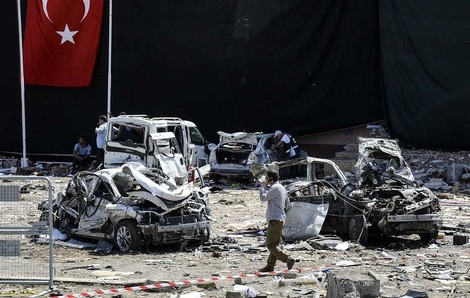Your podcast discovery platform
Curious minds select the most fascinating podcasts from around the world. Discover hand-piqd audio recommendations on your favorite topics.

piqer for: Global finds Globalization and politics Technology and society
Turkish journalist, blogger and media expert. Writes regular columns for The Arab Weekly and contributes to Süddeutsche Zeitung, El Pais and the Guardian. An European Press Prize Laureate for 'excellence in journalism' in 2014, Baydar was awarded the prestigious 'Journalistenpreis' in Germany by Südosteuropa Foundation in February 2018.
Turkey's 'Reset Warfare' With The PKK Kills Nearly 3,000 People In Two Years
When Turkish President Erdoğan under murky circumstances declared an end to his government's peace talks with the PKK, it came as a shock for many observers who had held an optimistic view that the end of violence was within reach.
20 July 2017 marked the two-year anniversary of the collapsed ceasefire and what has been seen since then is a geometrically escalated warfare, which among other measures led to the destruction of many ancient Kurdish settlements, such as Sur district in Diyarbakır and the city of Şırnak.
It was also the start of a violent cycle that has taken at least 2,981 lives, about three times more than during the July 2011–December 2012 escalation, when Crisis Group confirmed almost 1,000 deaths...nearly half were PKK militants (1,378), followed by state security force members (976) and civilians (408).
In this timely analysis, International Crisis Group (ICG), reaches gloomy conclusions after a scrutiny of data.
- Violence is unlikely to diminish in the near future.
- There is a risk of greater conflict as Ankara steps up military efforts to eradicate the PKK, limit YPG gains in northern Syria and marginalise the domestic, legal Kurdish movement.
- PKK remains focused on gains in northern Syria and may be further emboldened by the direct military support its affiliate, the YPG, now receives from the U.S. for the Raqqa offensive.
- The U.S. appears to temporarily have helped curb risks of escalation by pressuring the PKK to rein in attacks in Turkey’s densely-populated urban centres, including in the west of the country and by remaining closely engaged with the YPG (including in some instances by co-locating its special forces).
- Resumption of talks appears unlikely in the foreseeable future.
- Marginalisation of the legal Kurdish political movement could have long-term consequences, legitimising resorting to violent means and driving up PKK recruitment.
Stay up to date – with a newsletter from your channel on Globalization and politics.
